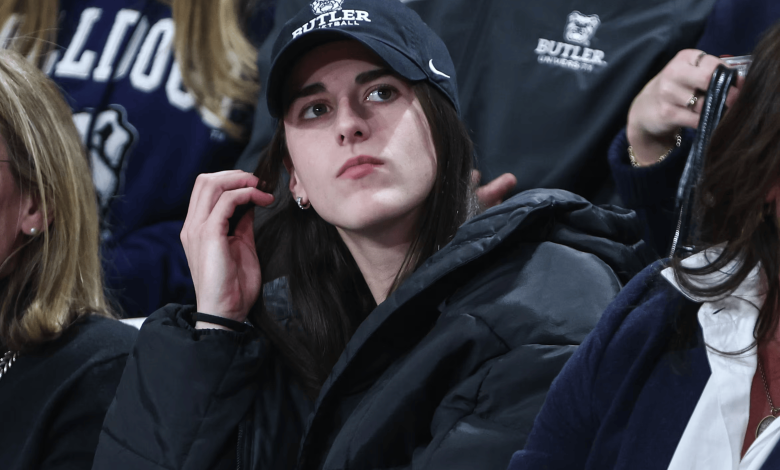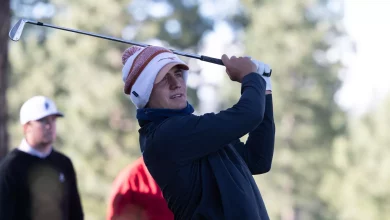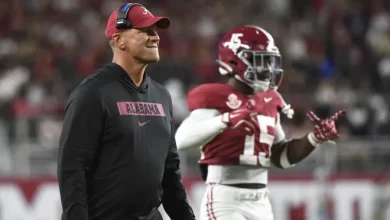A man was arrested for stalking Caitlin Clark in Indianapolis.

In a disturbing turn of events, a man was recently arrested for stalking Caitlin Clark, a rising star in the WNBA and one of the most celebrated athletes in women’s basketball. The arrest took place in Indianapolis, where Clark plays for the Indiana Fever, highlighting a broader and alarming issue: the safety of professional athletes, particularly women, who are frequently subjected to public scrutiny, admiration, and, at times, unwanted attention that can cross into the realm of harassment and stalking.
This incident involving Caitlin Clark is more than just a singular case—it serves as a reminder of the challenges many athletes face outside the spotlight of competition. While Clark has garnered widespread attention for her prowess on the basketball court, her experience underscores the darker side of fame, one that too often leaves athletes vulnerable to exploitation, obsession, and personal danger.
This article will explore the details surrounding the arrest, examine the broader implications for the safety of professional athletes, especially women, and provide context regarding the growing issue of stalking in the sports world.
Caitlin Clark: From College Superstar to WNBA Sensation
Caitlin Clark’s rise to fame has been nothing short of meteoric. Born and raised in West Des Moines, Iowa, Clark made a name for herself as a prolific scorer during her time with the Iowa Hawkeyes. She broke numerous NCAA records and captured the hearts of basketball fans across the country with her remarkable ability to score from anywhere on the court. Whether it was her deep three-pointers, flashy passes, or clutch performances in high-pressure moments, Clark became the face of college basketball, drawing comparisons to some of the sport’s greatest players.
Her success was not limited to the college game. Clark was selected as the first overall pick in the 2024 WNBA Draft by the Indiana Fever, marking the beginning of what is expected to be a stellar professional career. Upon joining the Fever, Clark quickly became one of the most exciting and talked-about rookies in the league. She was already a media sensation before she even played a single game in the WNBA, with endorsements, interviews, and a growing fanbase that extended far beyond the basketball world.
However, with fame and success also comes the potential for negative attention. The very qualities that make an athlete like Caitlin Clark so captivating—her visibility, popularity, and widespread recognition—also make her a target for individuals who may not have her best interests in mind.
The Stalking Incident: The Arrest in Indianapolis
The disturbing incident that led to the man’s arrest took place in Indianapolis, where Clark had been living and playing for the Fever. According to reports, the man, whose identity has not been disclosed, had been following Clark for some time, showing up at several public events and attempting to make direct contact with her.
The situation escalated when the man was reportedly spotted outside of Clark’s residence, exhibiting obsessive behavior and trying to engage with her. Authorities were alerted to the man’s actions, and after an investigation, he was arrested on charges of stalking and harassment. The arrest marks a serious escalation in what began as seemingly benign interactions but eventually crossed the line into a criminal act that threatened Clark’s sense of safety and privacy.
In the wake of the arrest, Clark’s legal team issued a statement condemning the man’s actions and reaffirming the importance of maintaining personal boundaries and respecting the privacy of individuals, especially those in the public eye. The statement highlighted the distress that such incidents cause and the steps necessary to ensure that public figures can live their lives without fear of harassment or harm.
Stalking, especially in the context of high-profile athletes, is a growing concern, as the rise of social media and the increasing visibility of sports figures have made it easier for fans and individuals to cross personal boundaries. While many fans support athletes in positive and respectful ways, there is an unfortunate subset of individuals who develop unhealthy obsessions that can quickly spiral into dangerous behavior.
The Psychological Impact of Stalking on Athletes
The psychological toll of stalking on athletes, particularly women, cannot be overstated. While athletes like Caitlin Clark are often lauded for their physical prowess and ability to perform under pressure, the emotional and psychological strain they face in their personal lives is equally significant. Stalking can lead to feelings of anxiety, fear, and a diminished sense of personal security.
For Caitlin Clark, this incident has forced her to reckon with the unsettling reality that her fame and visibility have made her vulnerable to unwanted attention. While the situation was ultimately addressed through law enforcement, the impact on Clark’s mental well-being cannot be minimized. As a rising star in the WNBA, Clark has a long career ahead of her, but this incident underscores the need for greater awareness and protection for athletes, particularly women, who may face such challenges.
The emotional effects of being stalked are often compounded by the public nature of the harassment. When fans or stalkers target an athlete, the personal becomes public, with social media platforms amplifying the situation. In some cases, athletes are forced to contend with threats and unwanted attention from thousands of people, creating an atmosphere of constant stress and fear. This phenomenon has been especially prevalent among women athletes, who are more likely to experience harassment and stalking than their male counterparts.
Athletes, especially those at the top of their game like Clark, are often told to “tough it out” or “ignore the noise,” but these situations can have lasting effects on their mental health and their ability to perform. The need for support systems, both personal and professional, is crucial for athletes as they navigate the complex intersection of public life and personal security.
The Broader Issue: Stalking in Sports
Caitlin Clark’s experience is not an isolated one. Stalking and harassment of athletes—particularly women—has been a growing issue in professional sports for some time. Across various leagues and sports, high-profile athletes have faced stalking, invasive media coverage, and public scrutiny that often extends far beyond what should be considered acceptable.
In addition to the obvious emotional and psychological toll that stalking takes on athletes, these incidents also highlight the broader issue of women’s safety in sports. Female athletes are often subjected to heightened levels of scrutiny and attention, and this can make them more vulnerable to predatory behavior. The balance between being in the public eye and maintaining personal privacy is delicate, and many female athletes report feeling unsafe or harassed by fans who feel entitled to access their personal lives.
From Olympic athletes to WNBA players, there are numerous accounts of women who have dealt with stalking, harassment, and even threats of violence. The advent of social media has only made matters worse, as it has become a tool for individuals to stalk, harass, and communicate with athletes in ways that were not possible in the past. Social media platforms, in particular, have blurred the lines between public and private life, making it easier for people to reach out to athletes directly, often crossing boundaries that would be unacceptable in any other context.
While there are laws in place to address stalking and harassment, many athletes, especially women, continue to experience these types of violations with little recourse. The systems in place to protect athletes are often insufficient, and there is a growing need for better protocols and support systems that can help athletes navigate these challenges in a safe and effective manner.
Legal and Institutional Response: What Needs to Change
Following the arrest of the man who stalked Caitlin Clark, the legal process is expected to unfold in accordance with the laws surrounding stalking and harassment. While the man faces legal consequences for his actions, this case raises larger questions about how professional athletes, particularly women, can be better protected in the future.
There is a need for stronger legal protections for athletes when it comes to stalking, harassment, and personal security. Many sports organizations and teams are beginning to recognize the gravity of the issue and are taking steps to ensure that their players are safe both on and off the court. However, more comprehensive measures are needed to address the growing problem.
Athletes, especially women in sports, need access to resources that can help them deal with harassment and stalking effectively. This may include mental health support, legal assistance, and the ability to work with law enforcement agencies to ensure that their safety is prioritized. Additionally, there needs to be greater public awareness of the importance of respecting athletes’ boundaries, both online and offline.
Sports organizations must also provide more robust protection for their players, including measures that ensure the safety of their personal lives. Whether it’s through enhanced security, better monitoring of fan behavior, or offering legal support, these organizations must take an active role in safeguarding their athletes.
The Road Ahead: Protecting Athletes and Ensuring Safety
The arrest of the man who stalked Caitlin Clark is a reminder that even in the world of professional sports, athletes are not immune to harassment, obsession, and invasion of their personal lives. For Caitlin Clark, the legal process will likely provide some measure of closure, but the psychological and emotional effects of this experience may last longer.
This incident has highlighted the need for increased protection for athletes and a broader conversation about the challenges they face off the court. As the sports world continues to evolve, it’s crucial that steps be taken to ensure that athletes, particularly women, can pursue their careers without the constant threat of stalking, harassment, or personal danger.
As Caitlin Clark continues to inspire millions with her talent and work ethic, it is our collective responsibility to ensure that her safety and well-being are prioritized. The stakes are high, and it’s time for all those involved in the sports world—from fans to teams to governing bodies—to recognize the importance of respecting personal boundaries and ensuring that athletes can thrive both on and off the field.









